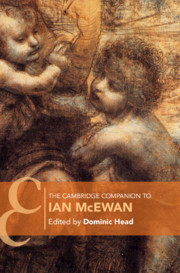Book contents
- The Cambridge Companion to Ian McEwan
- The Cambridge Companion to Ian McEwan
- Copyright page
- Contents
- Contributors
- Chronology
- Abbreviations
- Introduction
- 1 ‘Shock Lit’
- 2 Moral Dilemmas
- 3 Science and Climate Crisis
- 4 The Novel of Ideas
- 5 Cold War Fictions
- 6 The Construction of Childhood
- 7 The Public and the Private
- 8 Masculinities
- 9 The Novellas
- 10 Realist Legacies
- 11 Limited Modernism
- 12 Narrative Artifice
- Further Reading
- Index
- Cambridge Companions To…
9 - The Novellas
Published online by Cambridge University Press: 24 June 2019
- The Cambridge Companion to Ian McEwan
- The Cambridge Companion to Ian McEwan
- Copyright page
- Contents
- Contributors
- Chronology
- Abbreviations
- Introduction
- 1 ‘Shock Lit’
- 2 Moral Dilemmas
- 3 Science and Climate Crisis
- 4 The Novel of Ideas
- 5 Cold War Fictions
- 6 The Construction of Childhood
- 7 The Public and the Private
- 8 Masculinities
- 9 The Novellas
- 10 Realist Legacies
- 11 Limited Modernism
- 12 Narrative Artifice
- Further Reading
- Index
- Cambridge Companions To…
Summary
One aspect of McEwan’s celebrated status as a stylist is his distinctive contribution to the novella, a genre that arguably reached its pinnacle in the late nineteenth and early twentieth century. Novellas like Amsterdam (1998), with its focused critique of the left-leaning elite who did well in the Thatcher era, and On Chesil Beach (2007), with its (apparently) precise anatomy of sexual mores, reveal how McEwan uses the novella as an incisive instrument of cultural analysis. Embracing, as well, The Cement Garden (1978) and The Comfort of Strangers (1981), this chapter considers what it means to be an accomplished contemporary novella writer by making the case that, throughout his career, McEwan has continued to work with great skill in an overlooked literary form, once thought to be the most sophisticated mode of shorter fiction.
Keywords
- Type
- Chapter
- Information
- The Cambridge Companion to Ian McEwan , pp. 135 - 149Publisher: Cambridge University PressPrint publication year: 2019
- 1
- Cited by

